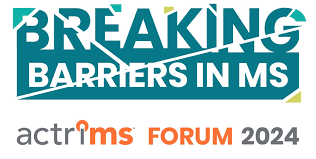- Center on Health Equity & Access
- Clinical
- Health Care Cost
- Health Care Delivery
- Insurance
- Policy
- Technology
- Value-Based Care
ICYMI: Highlights From ACTRIMS 2024
Read about the diverse array of research presented at this year's meeting, including novel technological advancements and insights into disease progression in multiple sclerosis (MS).
Our top coverage from this year’s Americas Committee for Treatment and Research in Multiple Sclerosis (ACTRIMS) included new insights into markers of disease progression in multiple sclerosis (MS), the emerging role of artificial intelligence (AI), advancements in imaging, the promise of remyelination, and more.
Below are the ACTRIMS 2024 conference highlights, please see here for all our coverage from this year’s event.
Breaking Barriers in MS: ACTRIMS 2024 logo | forums.actrims.org

5. Advancing the Clinical Understanding of MS: Emerging Concepts Presented at ACTRIMS 2024
Presentations delivered by Christian Cordano, MD, PhD, associate researcher of neurology at the University of California, San Francisco (UCSF), and Ateyeh Soroush, a PhD candidate from University of Calgary, provided new insights about indicators and influencers of MS progression. Cordano spoke to 2 trials which found reduced inner plexiform layer (IPL) thickness in patients with progressive MS, among other findings that demonstrated the connection between synaptic injury, inflammatory demyelination, and accelerated progressive disease.
Complementing these findings, Soroush discussed the role of hypoxia in MS progression. She highlighted how 45% of patients with MS exhibit lower oxygen levels and, as a result, diminished brain functioning and connectivity that can exacerbate the severity and progression of MS.
4. Promise of AI in MS Research and Treatment Showcased at ACTRIMS 2024
AI holds the potential to transform research and treatment approaches in MS. As highlighted by multiple poster sessions, AI has demonstrated strong predictive capabilities in Expanded Disability Status Scale (EDSS) scores and the ability to enhance MRI imaging. With 1 study indicating AI’s capacity to identify MS lesions with 80% accuracy, implementing this technology could provide immense benefits to personalized care and early diagnostic efforts, while additionally informing treatment approaches and anticipating patient outcomes.
3. Imaging and 3D Modeling a Key Focus at ACTRIMS 2024
Technological advancements remained a key topic of interest with this session’s focus on imaging the choroid plexus (CP) and progress in 3D modeling. Niels Bergsland, PhD, University of Buffalo focused on understanding the function and structure of CP to enrich clinical understandings of MS inflammation and progression. CP inflammation was found to correlate with MS progression and CP imaging was touted as a widely applicable given the ease of access to volume measures in MRI data.
Krystyn Van Vliet, PhD, Cornell University, demonstrated how 3D printing opens new opportunities in MS research. Through this practice, her and her team developed synthetic axons that structurally mimic those in humans. Over the course of this research, Van Vliet emphasized the value this 3D rendering brings to testing oligodendrocyte interactions, lesion environments, drug efficacy, and more.
2. Young Investigators Explore Aerobic Glycolysis, Paramagnetic Rim Lesions in MS
The second day of ACTRIMS uniquely featured presentations led by young investigators who overviewed novel insights into metabolic processes and cognitive impairments in MS. Bradley Judge, Washington University, St Louis, shed light onto the implications aerobic glycolysis (AG) has for MS, with his findings primarily suggesting that abnormalities in AG could be an early manifestation of MS and that different treatment approaches affect the interplay between AG, lesions, and inflammation. Hannah Schwartz, Cornell University, spoke to the prevalence of cognitive impairment in MS that worsens with progressive disease. In her research, the presence and concentration of paramagnetic rim lesions (PRLs) contributed to poorer cognitive performance and outcomes, suggesting the value of considering PRLs in personalized treatment approaches.
1. Dr Ari Green Describes Remyelination Benefits for Patients With MS, Challenges of Trials
The American Journal of Managed Care® sat down with Ari Green, MD, chief of the division of neuroimmunology and glial biology, UCSF, to discuss the impact remyelination can have for patients with MS. Green noted how remyelination remains a hopeful pursuit in MS because it can help to preserve patients’ axons and restore a neuron’s function. However, researchers face a lot of challenges and barriers when it comes to conducting remyelination trials, primarily in the realm of drug validation and development, reliable measurement tools, cost and resource obstacles, and necessary safety and regulatory considerations. To progress in this area, Green stressed the need for various future innovations and sufficient investments in this research.
Quality of Life: The Pending Outcome in Idiopathic Pulmonary Fibrosis
February 6th 2026Because evidence gaps in idiopathic pulmonary fibrosis research hinder demonstration of antifibrotic therapies’ impact on patient quality of life (QOL), integrating validated health-related QOL measures into trials is urgently needed.
Read More
